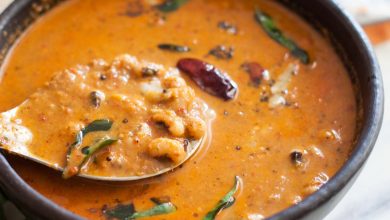Health Benefits of Rasna (Alpinia Galanga) Tea – An Ayurvedic Herbal Remedy
Rasna, scientifically known as Alpinia galanga, holds a revered position in Ayurvedic medicine for its potent medicinal properties. This herb is often used to alleviate inflammation, reduce joint pain, and promote overall well-being. By preparing a simple Rasna tea, you can harness its benefits while enjoying a soothing herbal infusion. Here’s how you can prepare this Ayurvedic medicinal tea.
Ingredients and Nutritional Information
| Ingredient | Quantity | Nutritional Benefits |
|---|---|---|
| Rasna roots and leaves | 3 stalks | Anti-inflammatory properties, aids digestion, supports joint health |
| Black pepper powder | 1/4 teaspoon | Rich in antioxidants, supports metabolism, and enhances nutrient absorption |
| Cumin powder (Jeera) | 1/4 teaspoon | Improves digestion, contains iron, and has detoxifying properties |
| Honey | 1 teaspoon (optional) | Natural sweetener, provides antioxidants, and soothes the throat |
| Water | 2 cups | Hydration and acts as a medium for extracting herbal compounds |
Servings: 2
Dietary Information: High Protein Vegetarian, Vegan-FriendlyRelated Articles
Preparation Details
| Steps | Time Required |
|---|---|
| Preparation Time | 5 minutes |
| Cooking Time | 20 minutes |
| Total Time | 25 minutes |
Step-by-Step Instructions
1. Prepare the Ingredients
- Gather fresh Rasna roots and leaves. Wash them thoroughly to remove any dirt or impurities.
- Chop the roots into small pieces and tear the leaves into smaller bits for better infusion.
2. Boil the Ingredients
- In a saucepan, combine 3 stalks of Rasna (both roots and leaves) with 2 cups of water.
- Place the saucepan on medium heat and bring it to a boil.
- Reduce the heat and let it simmer for about 15 minutes, allowing the water to reduce by half. This process creates a strong Rasna tea decoction.
3. Infuse with Spices
- Add 1/4 teaspoon each of black pepper powder and cumin powder to the boiling tea.
- Stir well and let it simmer for another 2-3 minutes, ensuring the spices are well infused into the decoction.
4. Strain and Serve
- Once the tea is ready, strain it using a fine-mesh sieve to remove the herbs and spices.
- Pour the strained tea into cups.
5. Sweeten (Optional)
- Add 1 teaspoon of honey to each cup for a natural sweetness. Stir well before serving.
- Serve the tea warm and enjoy its calming and therapeutic properties.
Culinary Tips
- Enhancements: To boost the flavor, consider adding a few drops of lemon juice or a pinch of turmeric for additional health benefits.
- Storage: Rasna tea is best enjoyed fresh. If you need to store it, keep it in a sealed container in the refrigerator for up to 24 hours and reheat gently before consuming.
Health Benefits of Rasna Tea
This herbal tea is not only comforting but also serves as a natural remedy for various ailments:
- Reduces Inflammation: The anti-inflammatory properties of Rasna help relieve joint pain and inflammation, making it beneficial for arthritis.
- Improves Digestion: Cumin and black pepper complement Rasna’s digestive benefits by reducing bloating and enhancing gut health.
- Boosts Immunity: With its antioxidant content, Rasna tea supports immune function and combats free radicals.
- Detoxifies the Body: This tea aids in detoxification by flushing out toxins from the body.
Serving Suggestions
- Pair this herbal tea with light snacks like roasted nuts or whole-grain crackers for a wholesome mid-day break.
- Enjoy it after a meal to aid digestion and promote relaxation.
Cultural and Ayurvedic Relevance
Rasna tea has been a part of traditional Ayurvedic practices for centuries. Often recommended during seasonal transitions, it helps the body adapt to changing weather and strengthens immunity. Ayurvedic texts also highlight its use in Panchakarma therapies, especially for balancing Vata dosha.
Experience the rejuvenating power of nature with this easy-to-make Rasna tea. Incorporate it into your daily routine for a healthier, more balanced lifestyle.




